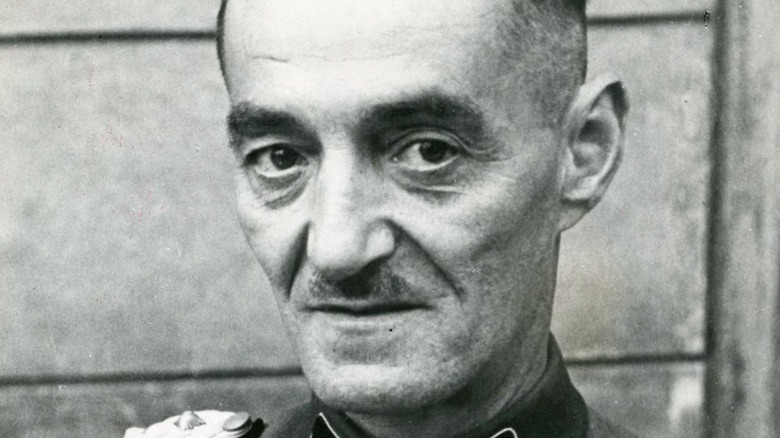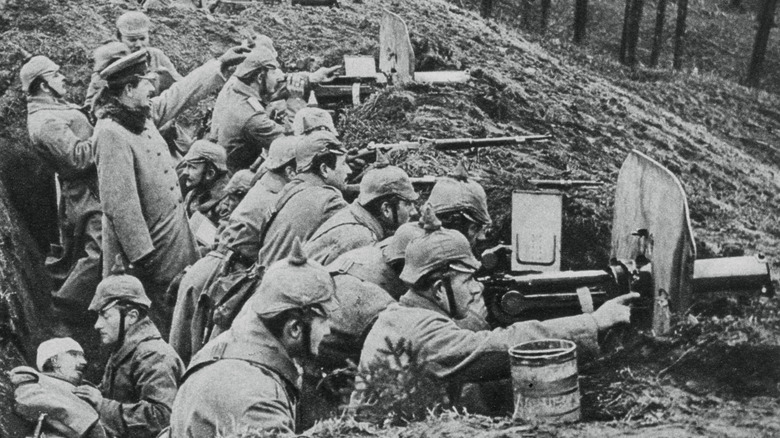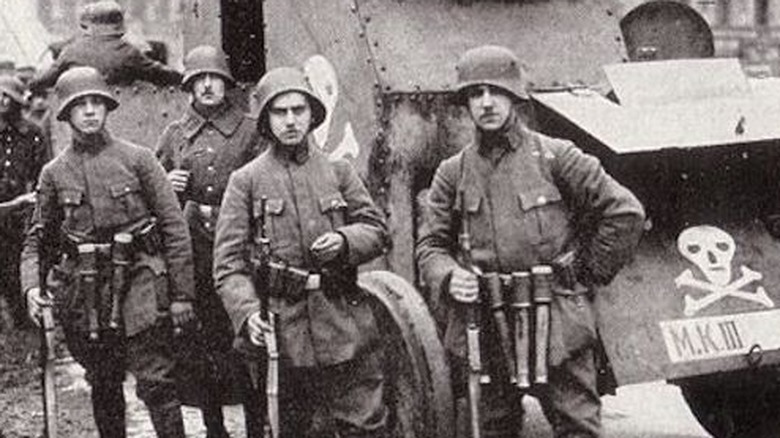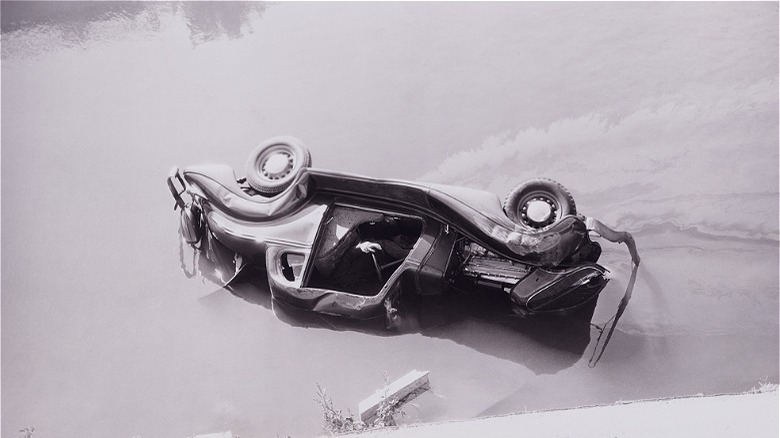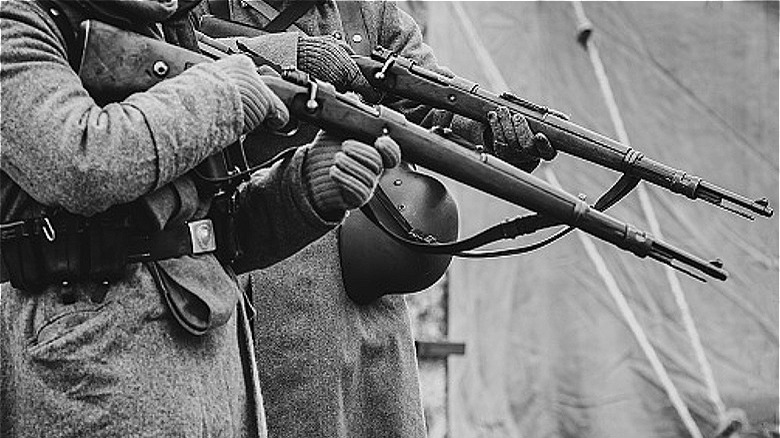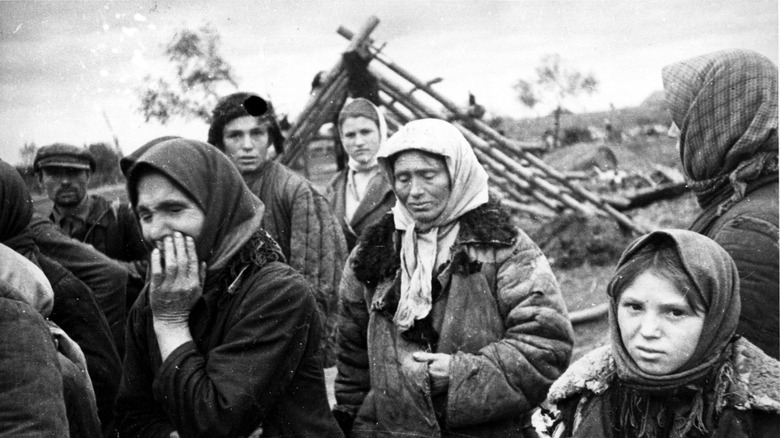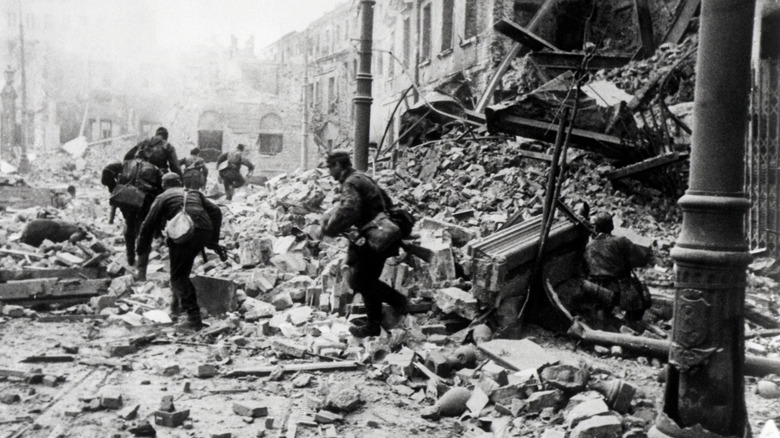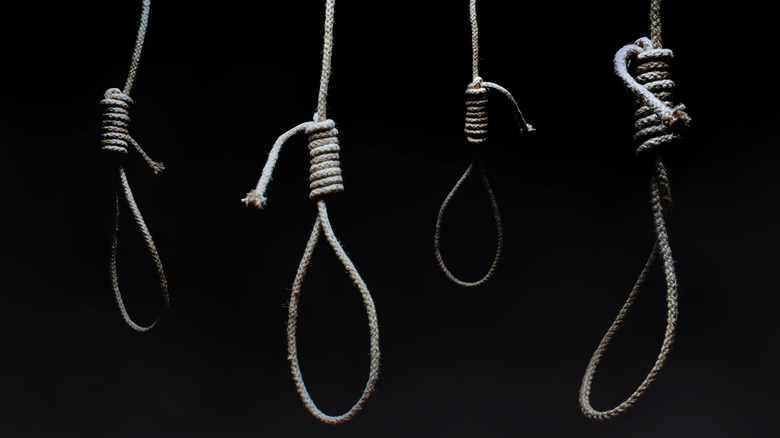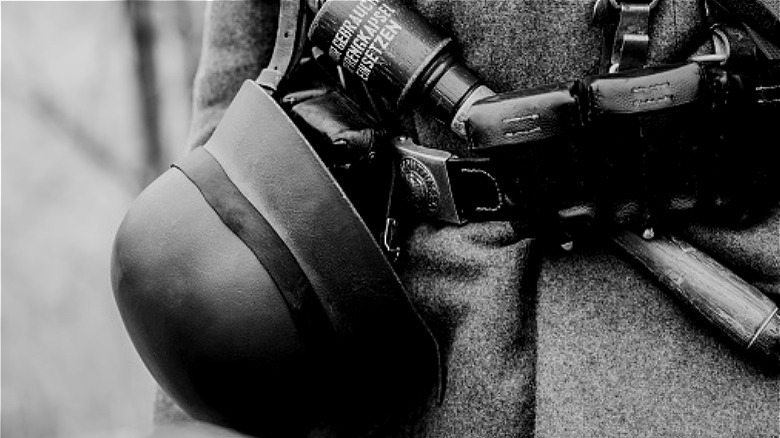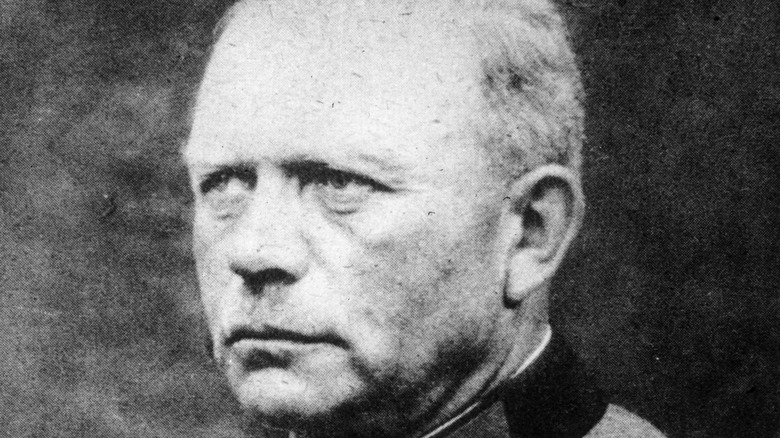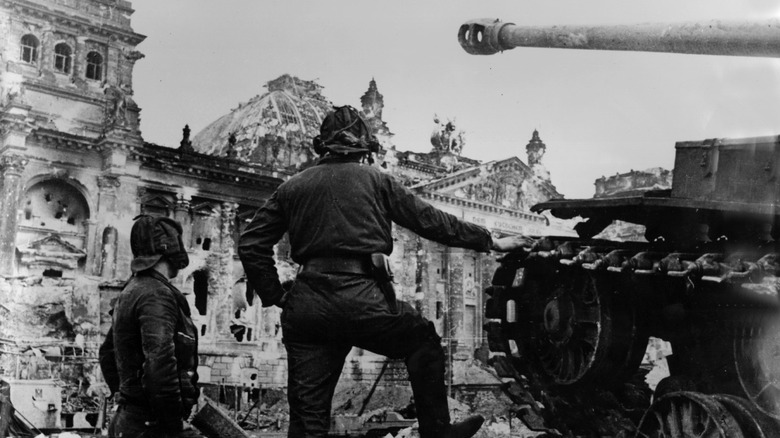The Twisted History Of Oskar Dirlewanger, The Nazis' Most Evil Officer
When it comes to evil people in history, few can top Adolf Hitler and his Nazi henchmen. Millions of words have been written about Heinrich Himmler, the ghoulish SS chief; Reinhard Heydrich, the man who chaired the Wannsee Conference; and Adolf Eichmann, the Holocaust bureaucrat who sent 440,000 Hungarian Jews to their deaths. But these men were bosses, speakers, and pen-pushers. What about those who actually perpetrated the regime's crimes with their guns, blades, fists, and boots?
Disturbingly, Christopher R. Browning's "Ordinary Men" tells us that many of them were just that, ordinary men conditioned by extraordinary circumstances. However, some were far from the regular, middle-aged characters of Browning's study. There were sadists, rapists, and cold-blooded murderers amongst the Nazi ranks, and if one had to find the very worst offender of them all, they would probably choose SS-Oberführer Oskar Dirlewanger, leader of the SS Special Commando Dirlewanger brigade.
"In all the theaters of the Second World War," wrote historian Timothy Snyder in "Bloodlands," "few could compete in cruelty with Dirlewanger." The extent of the brigade's crimes is impossible to fully quantify, but according to French MacLean, author of "The Cruel Hunters," the death toll was "certainly in the tens of thousands," and many of those were non-combatants. Here is the twisted history of Oskar Dirlewanger, the Nazis' most evil officer.
This article discusses sexual assault, torture, mass violence, and other disturbing topics.
[Featured image by Chetao via Wikimedia Commons | Cropped and scaled | CC BY-SA 3.0 DE]
His violent personality was shaped by the First World War
Born in Würzburg on September 26, 1895, Oskar Dirlewanger was 18 years old when the First World War broke out on July 28, 1914. Dirlewanger was already an established soldier in the 123rd Infantry Regiment and he would feel the bloody force of combat just weeks later on August 22, when he was shot in the foot and slashed in the chest, earning him an Iron Cross 2nd class and four months in hospital (via "The Cruel Hunters").
He was injured again on September 7, 1915, receiving a bullet through the hand and a bayonet in his right leg. Later, after numerous actions, medals, and promotions throughout the war, Dirlewanger was shot in the shoulder on April 30, 1918. By November of that year, the war would be lost and Dirlewanger would return to civilian life, now a chainsmoker who abused alcohol, with violence and indignation on his mind.
He was committed to violence during the interwar period
Oskar Dirlewanger channeled his anger by joining the Freikorps (Free Corps), a right-wing militia that would be responsible for some 354 political assassinations throughout Germany in the years after WWI ended (via History). The group was composed mainly of ideologues, disillusioned soldiers, and the unemployed, and their targets were communists, Weimar supporters, and anyone else guilty of the "stab-in-the-back" myth, which posited that Germany's loss came down to domestic treachery rather than military defeat.
Dirlewanger confronted his new political enemies in altercations across Germany, earning him a head injury and two stints in jail. The most notable event from this period was Dirlewanger's participation in the defense of Sangerhausen, which was the site of an attempted communist takeover in 1921. Protected by an armored train, Dirlewanger and his militia attacked the revolutionaries with grenades and machine gun fire until they surrendered in the small hours of the morning.
Emboldened by political combat, Dirlewanger joined the Nazi Party in 1923, as member No. 12,517. However, despite finding sanctuary with the National Socialists and their thuggish resolve, he was a hard man to discipline. SS leader Gottlob Berger said (via "The Cruel Hunters"), "[Dirlewanger] was a good soldier [but] he had one big mistake that he didn't know when to stop drinking."
Dirlewanger was convicted of child abuse
Despite finding causes in politics and earning a Ph.D. in economics from the University of Frankfurt, Oskar Dirlewanger could not control his recalcitrant impulses. In July 1934, under the influence of much alcohol, 38-year-old Dirlewanger crashed a government car into a ditch and assaulted an underage girl. According to an SA report (via "The Cruel Hunters"), Dirlewanger used government property for numerous encounters with girls under the age of 14.
Dirlewanger was sentenced to two years in prison, serving from January 11, 1935, to October 12, 1936. He left Ludwigsburg prison on parole and was thrown out of the Nazi Party, having lost face with seemingly everyone apart from the aforementioned Gottlob Berger, who recommended that Dirlewanger join the Condor Legion, which was fighting the Fascist cause in the Spanish Civil War.
In Spain, Colonel Wilhelm Ritter von Thoma described Dirlewanger's performance as "outstanding" and when the war ended in 1939, Dirlewanger saw his next big fight in the Second World War, which was brewing in the power centers of Europe.
He established a brigade of violent criminals
The Spanish Civil War went some way in rehabilitating Oskar Dirlewanger in the eyes of the Nazis, but not enough for Heinrich Himmler to accept his application to the Waffen-SS in the summer of 1939 (via "The Cruel Hunters").
However, on March 22, 1940, Hitler ordered that convicted poachers were to be granted clemency and drafted into a special sharpshooting unit. The Führer spoke fondly of such individuals, especially those from Bavaria and Austria, whom he saw as tough, provincial people with fierce Germanic identities (via "Bloodlands"). Two months after Hitler's curious request, Dirlewanger was also exonerated of his criminal past and, on June 4, was accepted into the Waffen-SS with the responsibility of leading the poacher squad, which was named SS Special Commando Dirlewanger on September 1, 1940.
Romantic notions of the men's libertarian authenticity were dashed upon their posting in Lublin, where the unit was reinforced with murderers and the criminally insane. With a team of the most lawless people in the German Reich, Dirlewanger was quick to take advantage of Lublin's ghetto, abusing and extorting its inhabitants. A typical crime would involve Dirlewanger arresting a group of Jewish residents, demanding large amounts of money, and shooting them if they failed to comply. Eventually, such cruelty would escalate to rape, torture, and murder on a ghastly scale.
Dirlewanger perpetrated massacres in Belarus
Of the 43 anti-partisan operations conducted in the Soviet Union from January 1942 to June 1944, SS Special Commando Oskar Dirlewanger was involved in over half of them, and they provided ample opportunities for grotesque violence (via "The Cruel Hunters").
German forces loathed partisan combat because the conditions were harsh and the enemy was ruthless and stealthy. Dirlewanger's approach to this was not to distinguish partisans from civilians but to just kill everyone, and he did this in numerous ways. A typical strategy would be to round up villagers by a large ditch and shoot them into it, but Dirlewanger's men would also herd villagers into barns, set them on fire, and kill any escapees with a machine gun. Forced mine clearance was another sadistic method and was probably observed with a certain sick anticipation (via "Bloodlands").
These mass murders against partisans, Jewish people, and civilians resulted in thousands of deaths. Dirlewanger's brigade killed 8,350 Jews in September 1942 alone, as well as 389 bandits and 1,274 "bandit suspects," whatever that dubious categorization means. Ukrainian Archbishop Count Andrij Scheptycky wrote of his concerns to the pope (via "Warsaw 1944" by Alexandra Richie), "Step by step, the Germans introduced their regime of terrible cruelty and corruption ... It simply appears that a bunch of madmen, or of rabid dogs, have descended upon the poor population."
Dirlewanger was involved in the brutal Warsaw Uprising of 1944
Oskar Dirlewanger is best known for his brutality during the Warsaw Uprising, although it seems he took more pride in his activities further east. "This is nothing," the SS-Oberführer said, mocking a question about his brutality (via "Warsaw 1944"), "You should have seen what we did in Byelorussia!" Dirlewanger's actions in Belarus were indeed terrible, but his crass comment doesn't quite ring true, for Warsaw's dense urban population allowed the brigade to kill with even greater wanton intensity.
According to "Bloodlands," Heinrich Himmler announced to Heinz Reinefarth, Dirlewanger's commander, that all Polish people, regardless of whether they were combatants, civilians, or children, were to be shot, and that the entire city of Warsaw was to be reduced to ashes. Dirlewanger followed these orders with aplomb. Schwarze Korps, a German Waffen-SS magazine, reported that he led the brigade with "unbelievable severity and tenacity." These were euphemisms for setting people on fire, and killing women and even infants in horrific ways (via "The Cruel Hunters").
Some of the worst violence occurred during the Wola massacre in early August, when Dirlewanger's men destroyed three hospitals, killing hundreds of patients. Shockingly, between 40,000 to 50,000 people died during the first week of the uprising, and a majority of these deaths can be attributed to Direlwanger's actions in the Wola and Ochota districts, where bodies lay strewn across the streets and picked apart by rats.
He took delight in torture
"[Oskar Dirlewanger was] an expert in extermination and a devotee of sadism," historian J. Boyer Bell concluded in "Besieged." Accounts of these paraphilias are extensive. For example, according to Richard Grunsberger's book "The 12-Year Reich," Dirlewanger is said to have injected naked Jewish girls with strychnine (a highly toxic pesticide), and delighted in their agonized deaths. Their bodies would then be dismembered, mixed with horse meat, and boiled into soap (via "The Cruel Hunters").
Another feature of Dirlewanger's violence was rape, especially during the degenerate hospital attacks of the Wola massacre in August 1944, after which the women were murdered (via "Bloodlands"). One evening was host to a sick spectacle in which doctors and nurses were hanged from improvised gallows, much to the brigade's drunken amusement.
At this point in the war, some nine months away from total defeat in May 1945, the men of SS Special Commando Dirlewanger were not so much soldiers but rather state-sponsored serial killers who lived for nothing more than death and cruelty.
He was a brutal manager
Oskar Dirlewanger took a hard line with his gang of misfits and criminals, sometimes fatally so. Heinrich Himmler, although broadly supportive, expressed some surprise at Dirlewanger's brutality. "The atmosphere in the regiment is often somewhat medieval in the use of corporal punishment," Himmler said during a speech in Poland, "if someone pulls a face when asked whether we will win the war or not he will slump down from the table ... dead, because the others will have shot him out of hand" (via "The Cruel Hunters").
Such knee-jerk violence was effective in maintaining the brigade's fanatical aggression, but it also sowed fear and disillusionment. "What have I really done so wrong that I must serve under such people who are looting and getting drunk," wrote SS-Unterscharführer Andreas Schillinger in a letter to Himmler, "...if one doesn't participate in it, they shun you."
Schillinger was undoubtedly in the company of some very bad people, but he should have considered himself lucky for experiencing only mild ostracism. In February 1945, Dirlewanger targeted a recent draftee and beat him for alleged cowardice, leaving him on the floor covered with blood. Three days later, the man received another, formal punishment of 30 lashes because of "cowardice in front of the enemy."
Even SS figures were disturbed by Dirlewanger's battalion
The SS was the ideological task force of Hitler's Reich. They killed millions in the name of National Socialism. Yet even an organization this profoundly immoral took exception to Oskar Dirlewanger's conduct, or so it seemed. One of Dirlewanger's main legal enemies was Dr. Konrad Morgen, a judge from Frankfurt known for his thorough investigations and proficiency in six languages (via "The Cruel Hunters"). In 1941, Morgen began compiling a long list of Dirlewanger's atrocities in Lublin and he presented them to his allies SS-Brigadeführer Odilo Globocnik and SS-Obergruppenführer Friedrich Krüger, who said, "[unless] this bunch of criminals disappears from the Government General within a week I will go myself and lock them up."
Despite this indignation, Gottlob Berger claimed at the Nuremberg Trials that Morgen's investigation concerned not so much Dirlewanger's alleged cruelty but his supposed violation of the Law for the Protection of German Blood and Honor, which banned all relations – namely sexual – between Aryans and Jewish people. Dirlewanger avoided these criminal charges and further investigations throughout the war, including one in 1942 that was dismissed by Heinrich Himmler, according to Robert S. Wistrich, author of "Who's Who in Nazi Germany."
Another notable grievance came from Colonel General Heinz Guderian, who asked Hitler to withdraw Dirlewanger's brigade from the appalling onslaught during the Warsaw Uprising of 1944. Senior SS General Herman Fegelein corroborated Guderian's claims, yet Hitler refused to withdraw the brigade.
He fled the Red Army but died in brutal circumstances
In December 1944, Oskar Dirlewanger fought along the Slovak-Hungarian border before receiving a transfer to Dresden in February 1945, where he disappeared following a reported injury (via "The Cruel Hunters").
Fearing capture, torture, and execution by the Soviets, Dirlewanger visited Gottlob Berger in Berlin before stopping at his parents' house in Esslingen, where, according to historian Hubert Kuberski, he retrieved a stash of valuable plunder. Then, en route to Swabia in southwest Germany, Dirlewanger ditched his SS uniform for civilian clothes. His plan was unclear, but Kuberski theorized that Dirlewanger was heading toward neutral Switzerland.
Whatever his intentions were, the war criminal did not achieve them. He was apprehended in the town of Althausen by either French or Polish guards and jailed at the Detention Centre Althausen, where he was beaten to death over several days in early June 1945. Fellow prisoner Anton Füssinger recalled how Dirlewanger was "pulled out of the cell every night and brutally beaten," filling the corridor with "terrible screams." The next morning, Füssinger observed "bleeding open wounds" on his face and "bleeding welts" across his body. Then, after subjecting Dirlewanger to three separate beatings, rendering the man unable to walk, the guards entered the cell for a fourth time and smashed his head with a rifle butt until it was "indiscernible bloody pulp."
